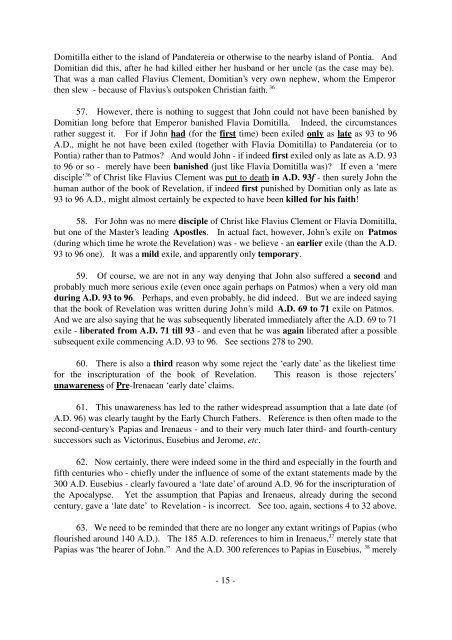JERUSALEM; ROME; REVELATION - The Preterist Archive
JERUSALEM; ROME; REVELATION - The Preterist Archive
JERUSALEM; ROME; REVELATION - The Preterist Archive
You also want an ePaper? Increase the reach of your titles
YUMPU automatically turns print PDFs into web optimized ePapers that Google loves.
Domitilla either to the island of Pandatereia or otherwise to the nearby island of Pontia. And<br />
Domitian did this, after he had killed either her husband or her uncle (as the case may be).<br />
That was a man called Flavius Clement, Domitian’s very own nephew, whom the Emperor<br />
then slew - because of Flavius’s outspoken Christian faith. 36<br />
57. However, there is nothing to suggest that John could not have been banished by<br />
Domitian long before that Emperor banished Flavia Domitilla. Indeed, the circumstances<br />
rather suggest it. For if John had (for the first time) been exiled only as late as 93 to 96<br />
A.D., might he not have been exiled (together with Flavia Domitilla) to Pandatereia (or to<br />
Pontia) rather than to Patmos? And would John - if indeed first exiled only as late as A.D. 93<br />
to 96 or so - merely have been banished (just like Flavia Domitilla was)? If even a ‘mere<br />
disciple’ 36 of Christ like Flavius Clement was put to death in A.D. 93f - then surely John the<br />
human author of the book of Revelation, if indeed first punished by Domitian only as late as<br />
93 to 96 A.D., might almost certainly be expected to have been killed for his faith!<br />
58. For John was no mere disciple of Christ like Flavius Clement or Flavia Domitilla,<br />
but one of the Master’s leading Apostles. In actual fact, however, John’s exile on Patmos<br />
(during which time he wrote the Revelation) was - we believe - an earlier exile (than the A.D.<br />
93 to 96 one). It was a mild exile, and apparently only temporary.<br />
59. Of course, we are not in any way denying that John also suffered a second and<br />
probably much more serious exile (even once again perhaps on Patmos) when a very old man<br />
during A.D. 93 to 96. Perhaps, and even probably, he did indeed. But we are indeed saying<br />
that the book of Revelation was written during John’s mild A.D. 69 to 71 exile on Patmos.<br />
And we are also saying that he was subsequently liberated immediately after the A.D. 69 to 71<br />
exile - liberated from A.D. 71 till 93 - and even that he was again liberated after a possible<br />
subsequent exile commencing A.D. 93 to 96. See sections 278 to 290.<br />
60. <strong>The</strong>re is also a third reason why some reject the ‘early date’ as the likeliest time<br />
for the inscripturation of the book of Revelation. This reason is those rejecters’<br />
unawareness of Pre-Irenaean ‘early date’ claims.<br />
61. This unawareness has led to the rather widespread assumption that a late date (of<br />
A.D. 96) was clearly taught by the Early Church Fathers. Reference is then often made to the<br />
second-century’s Papias and Irenaeus - and to their very much later third- and fourth-century<br />
successors such as Victorinus, Eusebius and Jerome, etc.<br />
62. Now certainly, there were indeed some in the third and especially in the fourth and<br />
fifth centuries who - chiefly under the influence of some of the extant statements made by the<br />
300 A.D. Eusebius - clearly favoured a ‘late date’ of around A.D. 96 for the inscripturation of<br />
the Apocalypse. Yet the assumption that Papias and Irenaeus, already during the second<br />
century, gave a ‘late date’ to Revelation - is incorrect. See too, again, sections 4 to 32 above.<br />
63. We need to be reminded that there are no longer any extant writings of Papias (who<br />
flourished around 140 A.D.). <strong>The</strong> 185 A.D. references to him in Irenaeus, 37 merely state that<br />
Papias was “the hearer of John.” And the A.D. 300 references to Papias in Eusebius, 38 merely<br />
- 15 -
















